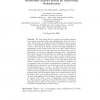Free Online Productivity Tools
i2Speak
i2Symbol
i2OCR
iTex2Img
iWeb2Print
iWeb2Shot
i2Type
iPdf2Split
iPdf2Merge
i2Bopomofo
i2Arabic
i2Style
i2Image
i2PDF
iLatex2Rtf
Sci2ools
128
click to vote
EUROCRYPT
2009
Springer
2009
Springer
Double-Base Number System for Multi-scalar Multiplications
Abstract. The Joint Sparse Form is currently the standard representation system to perform multi-scalar multiplications of the form [n]P + m[Q]. We introduce the concept of Joint Double-Base Chain, a generalization of the Double-Base Number System to represent simultaneously n and m. This concept is relevant because of the high redundancy of Double-Base systems, which ensures that we can nd a chain of reasonable length that uses exactly the same terms to compute both n and m. Furthermore, we discuss an algorithm to produce such a Joint DoubleBase Chain. Because of its simplicity, this algorithm is straightforward to implement, ecient, and also quite easy to analyze. Namely, in our main result we show that the average number of terms in the expansion is less than 0.3945 log2 n. With respect to the Joint Sparse Form, this induces a reduction by more than 20% of the number of additions. As a consequence, the total number of multiplications required for a scalar multiplications is minimal ...
Cryptography | EUROCRYPT 2009 | Koblitz Curves | Multi-scalar Multiplications | Scalar Multiplications |
| Added | 24 Nov 2009 |
| Updated | 24 Nov 2009 |
| Type | Conference |
| Year | 2009 |
| Where | EUROCRYPT |
| Authors | Christophe Doche, David R. Kohel, Francesco Sica |
Comments (0)

